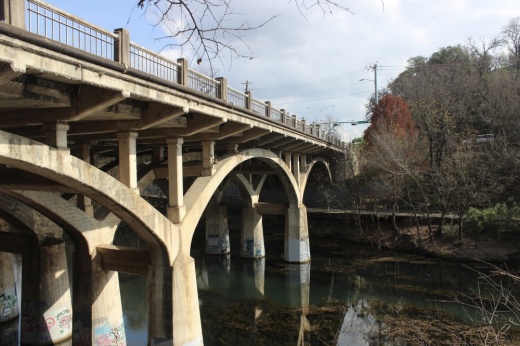What happened
City Council made the decision to move ahead with a replacement project, rather than an alternative full-scale rehabilitation, on Dec. 14. Officials and staff have been planning for the 97-year-old bridge's future as it's sat on Austin's list of priority structures in need of help for years.
While city transportation planners said the bridge is not yet a public safety risk, Austin did move this year to limit the heaviest traffic over the span, and officials warned further traffic limits could be needed without a long-term fix.
Assistant City Manager Robert Goode told City Council Dec. 12 that concerns about the bridge's continued stability stretch back to his previous stint at City Hall in the 2000s.
“The risk profile during that time was such that we could extend the life, but I’m going to tell you today something I don’t usually do with the mayor and council: I’m going to put a different hat on today. As a professional engineer, I’m concerned," Goode said. "It’s going to take a while to design and replace this bridge, and so we need to make some decisions and move on.”
The background
After staff moved toward recommending one of several proposed replacement options last year, council members selected it this December. The recommendation followed a community survey that found Austinites evenly split between desires for bridge rehab versus replacement.

The city previously set aside funding from recent mobility bond programs for the bridge's eventual replacement or repair. The design stage will pull $10 million from the 2020 bond, while $37 million needed for construction will be identified in future project phases.
Eric Bailey, acting deputy director with Austin Capital Delivery Services, said a period of public engagement and council's stamp of approval were needed to move the bridge project forward as an extra layer of review required by the city's 2020 mobility bond language.
“This is not, ‘We’re starting construction tomorrow.’ This is an authorization to move forward with the recommended alternative, to move that into design," he said.
The details
Plans include replacing the existing two-lane structure and its narrow sidewalks with a wider four-lane bridge featuring expanded cyclist and pedestrian pathways. The project will also upgrade shared-use pathways along Barton Springs Road on either side of the bridge and improve the Azie Morton intersection on its eastern side.

“Obviously there are multiple users who enjoy this bridge on a daily basis, including 20,000 vehicles per day. It’s a key access point into Zilker Park and a contributing structure to the historic designation of Zilker Park," Bailey said.
The selected replacement plan will cost roughly the same as a rehab would have, according to staff, and is expected to produce a bridge that would last at least 75 years—25 years longer than the alternative.
As design work progresses, Bailey said the community will have additional opportunities to check in on the project, and the city will work to ensure historic and environmental benchmarks are met. Austin officials are in contact with the Texas Historic Commission and will present to relevant resident boards and commissions along the way, he said.
Quote of note
"I appreciate everyone’s perspective in trying to make sure that this bridge is not only visually appealing but adds to the aesthetic of Zilker Park, which we all know and love very much. But there are some very important mobility improvements that are needed, and right now between our transportation and public works staff, and Vision Zero program there’s some great mobility improvements on either end of this bridge allowing for pedestrian-bike connectivity and for the CapMetro 30 route to be able to allow people to access the park safely," Mayor Pro Tem Paige Ellis said. "I’m excited that this bridge is going to be a part of that conversation and that staff hopefully can move forward with the same level of care and understanding that they always have.”





